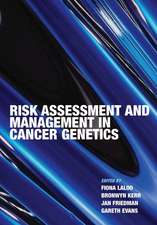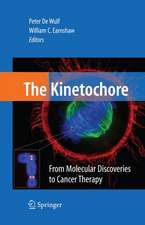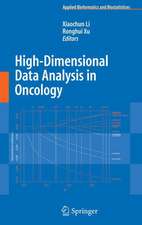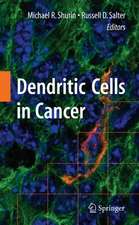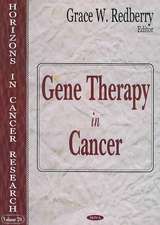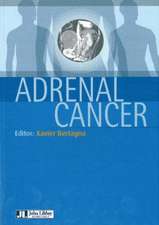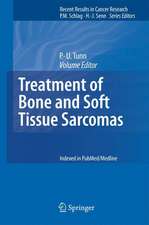Biological Mechanisms of Minimal Residual Disease and Systemic Cancer: Advances in Experimental Medicine and Biology, cartea 1100
Editat de Julio A. Aguirre-Ghisoen Limba Engleză Hardback – 22 noi 2018
This book focuses on the biological mechanisms of minimal residual disease (MRD) and recurrence. It integrates this biology in solid cancers and in hematological malignancies. It reports also on technological advancements for monitoring MRD, derived from mechanistic insights. Chapters in solid and hematological malignancies address stem cell biology, genetics, epigenetics and micro-environmental regulation of dormant MRD. Novel insight into technologies for molecular phenotyping of MRD and monitoring of CTCs, DTCs and cell free RNA and DNA are also addressed extensively.
Five chapters explore the above concepts in solid cancers such as prostate, breast, melanoma, head and neck and esophageal. Two chapters also explore the basic mechanisms of vascular biology targeting and epigenetic mechanisms regulating pluripotency programs during dormancy. Similar biology is explored in hematological malignancies such as T-ALL, CML, AML and multiple myeloma in additional four chapters.
This book is edited and prefaced by Dr. Julio Aguirre-Ghiso, an expert in dormancy and recurrence. The chapters are written by world-recognized experts Drs. Ravi Bahtia, Samir Parekh, Russel Taichman, Monica Guzman, David Hoon, Denis Schewe, Irmela Jeremias, Cyrus Ghajar, Maria Soledad Sosa and Nicholas Stoecklein.
The topic of this book is of particular interest to both basic cancer cell biologists and physician scientists that are working to provide a more integrated view of the biology of MRD and to those interested in working on or learning about this paradigm. The integrated and cross-disciplinary focus of the book from biology to medicine seeks to help bridge gaps to improve cancer care and prevent recurrences.
Five chapters explore the above concepts in solid cancers such as prostate, breast, melanoma, head and neck and esophageal. Two chapters also explore the basic mechanisms of vascular biology targeting and epigenetic mechanisms regulating pluripotency programs during dormancy. Similar biology is explored in hematological malignancies such as T-ALL, CML, AML and multiple myeloma in additional four chapters.
This book is edited and prefaced by Dr. Julio Aguirre-Ghiso, an expert in dormancy and recurrence. The chapters are written by world-recognized experts Drs. Ravi Bahtia, Samir Parekh, Russel Taichman, Monica Guzman, David Hoon, Denis Schewe, Irmela Jeremias, Cyrus Ghajar, Maria Soledad Sosa and Nicholas Stoecklein.
The topic of this book is of particular interest to both basic cancer cell biologists and physician scientists that are working to provide a more integrated view of the biology of MRD and to those interested in working on or learning about this paradigm. The integrated and cross-disciplinary focus of the book from biology to medicine seeks to help bridge gaps to improve cancer care and prevent recurrences.
Din seria Advances in Experimental Medicine and Biology
- 9%
 Preț: 719.56 lei
Preț: 719.56 lei - 5%
 Preț: 717.00 lei
Preț: 717.00 lei - 5%
 Preț: 717.00 lei
Preț: 717.00 lei - 15%
 Preț: 640.24 lei
Preț: 640.24 lei - 5%
 Preț: 715.71 lei
Preț: 715.71 lei - 5%
 Preț: 716.28 lei
Preț: 716.28 lei - 20%
 Preț: 691.93 lei
Preț: 691.93 lei - 5%
 Preț: 1031.00 lei
Preț: 1031.00 lei - 5%
 Preț: 820.42 lei
Preț: 820.42 lei - 5%
 Preț: 716.28 lei
Preț: 716.28 lei - 15%
 Preț: 641.38 lei
Preț: 641.38 lei - 5%
 Preț: 717.20 lei
Preț: 717.20 lei - 5%
 Preț: 715.35 lei
Preț: 715.35 lei - 5%
 Preț: 1113.83 lei
Preț: 1113.83 lei - 20%
 Preț: 1161.71 lei
Preț: 1161.71 lei - 5%
 Preț: 1170.51 lei
Preț: 1170.51 lei - 18%
 Preț: 1119.87 lei
Preț: 1119.87 lei - 5%
 Preț: 1288.48 lei
Preț: 1288.48 lei - 5%
 Preț: 1164.67 lei
Preț: 1164.67 lei - 5%
 Preț: 1101.73 lei
Preț: 1101.73 lei - 18%
 Preț: 1123.67 lei
Preț: 1123.67 lei - 5%
 Preț: 1435.64 lei
Preț: 1435.64 lei - 20%
 Preț: 1044.10 lei
Preț: 1044.10 lei - 18%
 Preț: 946.39 lei
Preț: 946.39 lei - 5%
 Preț: 292.57 lei
Preț: 292.57 lei - 18%
 Preț: 957.62 lei
Preț: 957.62 lei - 18%
 Preț: 1235.76 lei
Preț: 1235.76 lei - 5%
 Preț: 1231.55 lei
Preț: 1231.55 lei - 5%
 Preț: 1292.30 lei
Preț: 1292.30 lei - 5%
 Preț: 1102.10 lei
Preț: 1102.10 lei - 18%
 Preț: 1132.81 lei
Preț: 1132.81 lei - 5%
 Preț: 1165.19 lei
Preț: 1165.19 lei - 5%
 Preț: 1418.48 lei
Preț: 1418.48 lei - 5%
 Preț: 1305.63 lei
Preț: 1305.63 lei - 18%
 Preț: 1417.72 lei
Preț: 1417.72 lei - 18%
 Preț: 1412.99 lei
Preț: 1412.99 lei - 24%
 Preț: 806.15 lei
Preț: 806.15 lei - 18%
 Preț: 1243.29 lei
Preț: 1243.29 lei - 5%
 Preț: 1429.44 lei
Preț: 1429.44 lei - 5%
 Preț: 1618.70 lei
Preț: 1618.70 lei - 5%
 Preț: 1305.12 lei
Preț: 1305.12 lei - 18%
 Preț: 1124.92 lei
Preț: 1124.92 lei - 15%
 Preț: 649.87 lei
Preț: 649.87 lei - 5%
 Preț: 1097.54 lei
Preț: 1097.54 lei - 18%
 Preț: 945.79 lei
Preț: 945.79 lei - 5%
 Preț: 1123.13 lei
Preț: 1123.13 lei - 20%
 Preț: 816.43 lei
Preț: 816.43 lei
Preț: 1097.54 lei
Preț vechi: 1155.30 lei
-5% Nou
Puncte Express: 1646
Preț estimativ în valută:
210.03€ • 216.100$ • 174.71£
210.03€ • 216.100$ • 174.71£
Carte disponibilă
Livrare economică 26 februarie-12 martie
Preluare comenzi: 021 569.72.76
Specificații
ISBN-13: 9783319977454
ISBN-10: 3319977458
Pagini: 220
Ilustrații: IX, 162 p. 13 illus., 10 illus. in color.
Dimensiuni: 178 x 254 mm
Greutate: 0.5 kg
Ediția:1st ed. 2018
Editura: Springer International Publishing
Colecția Springer
Seria Advances in Experimental Medicine and Biology
Locul publicării:Cham, Switzerland
ISBN-10: 3319977458
Pagini: 220
Ilustrații: IX, 162 p. 13 illus., 10 illus. in color.
Dimensiuni: 178 x 254 mm
Greutate: 0.5 kg
Ediția:1st ed. 2018
Editura: Springer International Publishing
Colecția Springer
Seria Advances in Experimental Medicine and Biology
Locul publicării:Cham, Switzerland
Cuprins
Preface.- Foreword. Understanding and targeting minimal residual disease: a path to change cancer patient outcomes.- Epigenetics and Pluripotency Aspects of Disseminated Cancer Cells during Minimal Residual Disease.- Anti-angiogenic therapy-mediated endothelial damage: A driver of breast cancer recurrence?- Minimal Residual Disease in Prostate Cancer.- Minimal Residual Disease in Head and Neck Cancer and Esophageal Cancer.- Detection of Minimal Residual Disease and its Clinical Applications in Melanoma and Breast Cancer Patients Selena.- Preservation of Quiescent Chronic Myelogenous Leukemia Stem Cells by the Bone Marrow Microenvironment.-Minimal Residual Disease in Acute Myeloid leukemia.- Characteristics and therapeutic targeting of minimal residual disease in childhood acute lymphoblastic leukemia.- Minimal Residual Disease in Multiple Myeloma: Impact on response assessment, prognosis and tumor heterogeneity.- Index.
Notă biografică
Professor Dr. Julio Aguirre-Ghiso is the Director of Head and Neck Cancer Basis Research and Solid Tumor and Metastasis Research. His research group is part of the Division of Hematology and Oncology, Department of Medicine in Mount Sinai. Professor Aguirre-Ghiso has made outstanding contributions in unraveling the Biology of Residual Disease.
Textul de pe ultima copertă
This book focuses on the biological mechanisms of minimal residual disease (MRD) and recurrence. It integrates this biology in solid cancers and in hematological malignancies. It reports also on technological advancements for monitoring MRD, derived from mechanistic insights. Chapters in solid and hematological malignancies address stem cell biology, genetics, epigenetics and micro-environmental regulation of dormant MRD. Novel insight into technologies for molecular phenotyping of MRD and monitoring of CTCs, DTCs and cell free RNA and DNA are also addressed extensively.
Five chapters explore the above concepts in solid cancers such as prostate, breast, melanoma, head and neck and esophageal. Two chapters also explore the basic mechanisms of vascularbiology targeting and epigenetic mechanisms regulating pluripotency programs during dormancy. Similar biology is explored in hematological malignancies such as T-ALL, CML, AML and multiple myeloma in additional four chapters.
This book is edited and prefaced by Dr. Julio Aguirre-Ghiso, an expert in dormancy and recurrence. The chapters are written by world-recognized experts Drs. Ravi Bahtia, Samir Parekh, Russel Taichman, Monica Guzman, David Hoon, Denis Schewe, Irmela Jeremias, Cyrus Ghajar, Maria Soledad Sosa and Nicholas Stoecklein.
The topic of this book is of particular interest to both basic cancer cell biologists and physician scientists that are working to provide a more integrated view of the biology of MRD and to those interested in working on or learning about this paradigm. The integrated and cross-disciplinary focus of the book from biology to medicine seeks to help bridge gaps to improve cancer care and prevent recurrences.
Caracteristici
Provides unprecedented insight into the biology of MRD dormancy and metastasis initiation in solid cancers Brings together a unique comparative review of technologies used to detect MRD in solid cancers and hematological malignancies Reviews the mechanistic underpinnings and modern monitoring modalities for dormant MRD and recurrence in hematological malignancies

